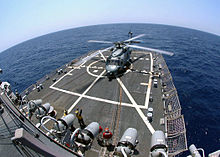
A helicopter deck (or helo deck) is a helicopter pad on the deck of a ship, usually located on the stern and always clear of obstacles that would prove hazardous to a helicopter landing. In the United States Navy, it is commonly and properly referred to as the flight deck.
In the Royal Navy, landing on is usually achieved by first lining up on the port quarter parallel to the ship's heading, then once the deck motion is deemed to be acceptable the pilot sidesteps the aircraft laterally using a white painted line (the bum line) as a reference.
Shipboard landing for some helicopters is assisted though use of a haul-down device that involves attachment of a cable to a probe on the bottom of the aircraft prior to landing. Tension is maintained on the cable as the helicopter descends, assisting the pilot with accurate positioning of the aircraft on the deck; once on deck locking beams close on the probe, locking the aircraft to the flight deck. This device was pioneered by the Royal Canadian Navy and was called "Beartrap". The U.S. Navy implementation of this device, based on Beartrap, is called the "RAST" system (for Recovery Assist, Secure and Traverse) and is an integral part of the LAMPS Mk III (SH-60B) weapons system.